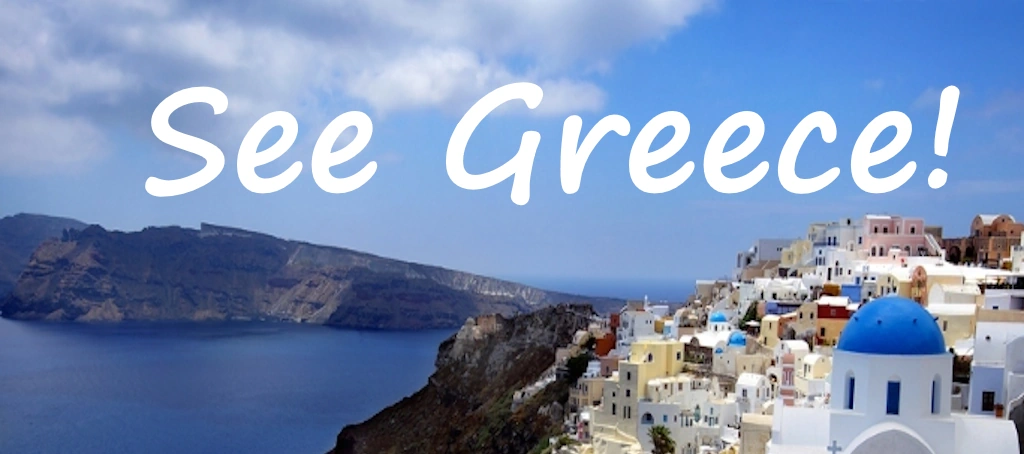The See Greece guide to the island of Chalki (Halki) with a brief history and travel information on how to get there by ferry or by air and what to see and do.

Introduction
Chalki (or Halki) is one of the smallest and most tranquil islands in the Dodecanese. With its charming neoclassical architecture, crystal-clear waters, and relaxed atmosphere, Chalki offers an idyllic escape from the busier Greek tourist destinations. This guide covers everything you need to know before visiting—from its fascinating history to the best things to see and do, the ideal time to visit, and how to get there by air and ferry.
Where is Chalki?

Chalki is located 6 km west of Rhodes, making it an easy day trip or short getaway from its much larger neighbor. The island is part of the Dodecanese group, which also includes popular destinations like Kos, Symi, and Patmos. Despite its small size (just 28 km²), Chalki boasts dramatic landscapes, from rugged hills to pristine beaches.
The main settlement, Nimborio (Emborio), is the island’s only inhabited village, featuring colorful mansions and a picturesque harbor. The rest of the island is sparsely populated, offering a true off-the-beaten-path experience.
A Brief History of Chalki
Chalki has a rich history shaped by various civilizations:
– Ancient Times: The island was once an important center for sponge diving and trade, with evidence of settlements dating back to the Classical and Hellenistic periods.
– Byzantine & Medieval Era: Like much of the Dodecanese, Chalki was ruled by the Byzantines before falling under the Knights of St. John in the 14th century.
– Ottoman Rule: The island was controlled by the Ottoman Empire from the 16th century until the early 20th century.
– Italian Occupation: After the Italo-Turkish War (1912), Chalki came under Italian rule, which left a lasting architectural influence, particularly in Nimborio.
– Modern Era: The island’s population declined sharply in the mid-20th century due to emigration, but today it thrives on tourism and fishing.
Chalki was also the first Greek island to become 100% energy self-sufficient through renewable energy (2019), showcasing its commitment to sustainability.

What to See and Do on Chalki
Despite its small size, Chalki offers plenty of activities for visitors seeking relaxation, history, and natural beauty.
1. Explore Nimborio (Emborio)
The island’s main village is a postcard-perfect settlement with pastel-colored Italianate mansions lining the waterfront. Key highlights include:
– The Clock Tower: A landmark in the main square.
– St. Nicholas Church: The island’s cathedral, featuring an impressive bell tower.
– The Abandoned Village of Chorio: A short hike uphill leads to the ruins of the old capital, offering panoramic views and the remains of a medieval castle.
2. Visit the Beaches
Chalki’s coastline is dotted with secluded coves and sandy shores:
– Pondamos Beach: The most popular beach, with golden sand and shallow waters.
– Ftenagia Beach: A quieter pebble beach near Nimborio.
– Kania Beach: A remote spot accessible only by boat or a rough hiking trail.
– Trachia Island: A small islet opposite Chalki, perfect for snorkeling.

3. Take a Boat Tour
Local boats offer trips to uninhabited islets like Alimia, where you can explore an abandoned village and swim in turquoise waters.
4. Hike to the Monastery of St. John
A scenic 1.5-hour hike leads to this 19th-century monastery, offering breathtaking views of the Aegean.
5. Enjoy Fresh Seafood & Local Cuisine
Chalki is known for its lobster pasta (astakomakaronada) and fresh fish. Top tavernas include:
– Taverna Gali (waterfront dining)
– Pefkaki Café-Restaurant (great sunset views)
6. Discover the Abandoned Mines
Near Pondamos Beach, you’ll find old iron and manganese mines, remnants of Chalki’s industrial past.

Best Time to Visit Chalki
The best time to visit Chalki is between May and October, when the weather is warm and ferry connections are frequent.
– May-June & September-October: Ideal for mild temperatures, fewer crowds, and lower prices.
– July-August: Peak season—great for swimming but busier.
– Winter (November-April): Most businesses close, and ferry schedules are limited.

How to Get to Chalki
By Air
Since Chalki has no airport, the nearest option is:
1. Fly to Rhodes International Airport (RHO) – Direct flights from Athens (1 hr) and major European cities in summer.
2. Take a ferry from Rhodes (see below).
By Ferry
Ferries to Chalki depart from Rhodes, with occasional connections from other Dodecanese islands.
– From Rhodes (Mandhraki Port):
– Fast boats: 1-1.5 hrs (operated by Dodekanisos Seaways).
– Conventional ferries: 2-3 hrs (slower but cheaper).
– From Piraeus (Athens): Occasional overnight ferries (12+ hrs).
Tip: Check schedules on Ferryhopper or Direct Ferries, as services reduce outside peak season.

Final Tips for Visiting Chalki
– No cars are needed—the island is best explored on foot or by bike.
– Cash is essential—ATMs are scarce.
– Book accommodation early in summer, as options are limited.
– Combine with Rhodes—many visitors take a day trip from Rhodes.





















